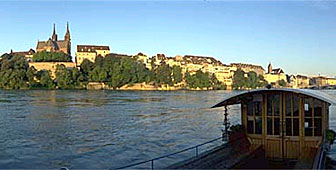
Basel celebrates joining the Swiss Confederation

Celebrations are underway in Basel to mark the 500th anniversary of its union with the Swiss Confederation. The first event held on Friday was an official reception, attended by 600 guests, close to the Roman ruins of Augusta Raurica.
Addressing the gathering, Barbara Schneider, the head of government of Basel City, said Basel was very comfortable with its position within Switzerland.
“We have never regretted the decision of 1501,” Schneider said, referring to Basel’s entry into what was then a loose alliance of cities and regions trying to free themselves from the grip of neighbouring monarchies.
Basel has always been an important crossroads on the Rhine, guarding one of the main routes between the north and south of Europe. From the time of its foundation nearly 2,000 years ago, the city has been a prize lusted after by many but conquered by few.
Since the beginning of the second millennium, Basel was tied to the Holy Roman Empire. But trade with other regions, including the Swiss Confederation, meant the city’s leaders had to keep their wits about them to preserve their neutrality in a continent constantly ravaged by war.
Basel’s importance as a trade centre was recognised by the Holy Roman Empire, and it was given the title of “free city”. Proof of its cultural and intellectual weight was the creation of the university in 1460 and the earlier Catholic Church council between 1431 and 1448.
It was only after the Swabian war between the Swiss and the Empire’s allies at the end of the 15th century that supporters of the Confederation gained the upper hand in Basel. Furthermore, the Austrian nobility, which controlled the areas surrounding the city, were openly hostile.
This was enough to convince Basel that its best interests lay with the Swiss alliance. Historians also believe a loss of importance of the trade routes passing through the Alps to Italy gave the city more leeway when it came to deciding its own future.
The Swiss cantons were also interested in Basel for strategic reasons. Bern in particular wanted to extend and reinforce the Confederation’s northern borders.
Basel’s burghers swore an oath of loyalty to the Swiss alliance on July 13, 1501, also known as “Heinrichstag”, in memory of the city’s patron, emperor Henry II. It became the Confederation’s biggest city, with over 10,000 inhabitants.
Basel split into two cantons in the 19th century. The modern, federal state of Switzerland was created in 1848, defining the country’s borders for the last time.
Friday’s official celebrations include a reading of the original oath of allegiance at Basel cathedral, after a trip along the Rhine from Augst. The residents will get to join in the fun from August 17 to the 19.
The celebrations are just part of a year-long remembrance of Basel’s past, with concerts, exhibitions and other events.
swissinfo

In compliance with the JTI standards
More: SWI swissinfo.ch certified by the Journalism Trust Initiative




























You can find an overview of ongoing debates with our journalists here . Please join us!
If you want to start a conversation about a topic raised in this article or want to report factual errors, email us at english@swissinfo.ch.